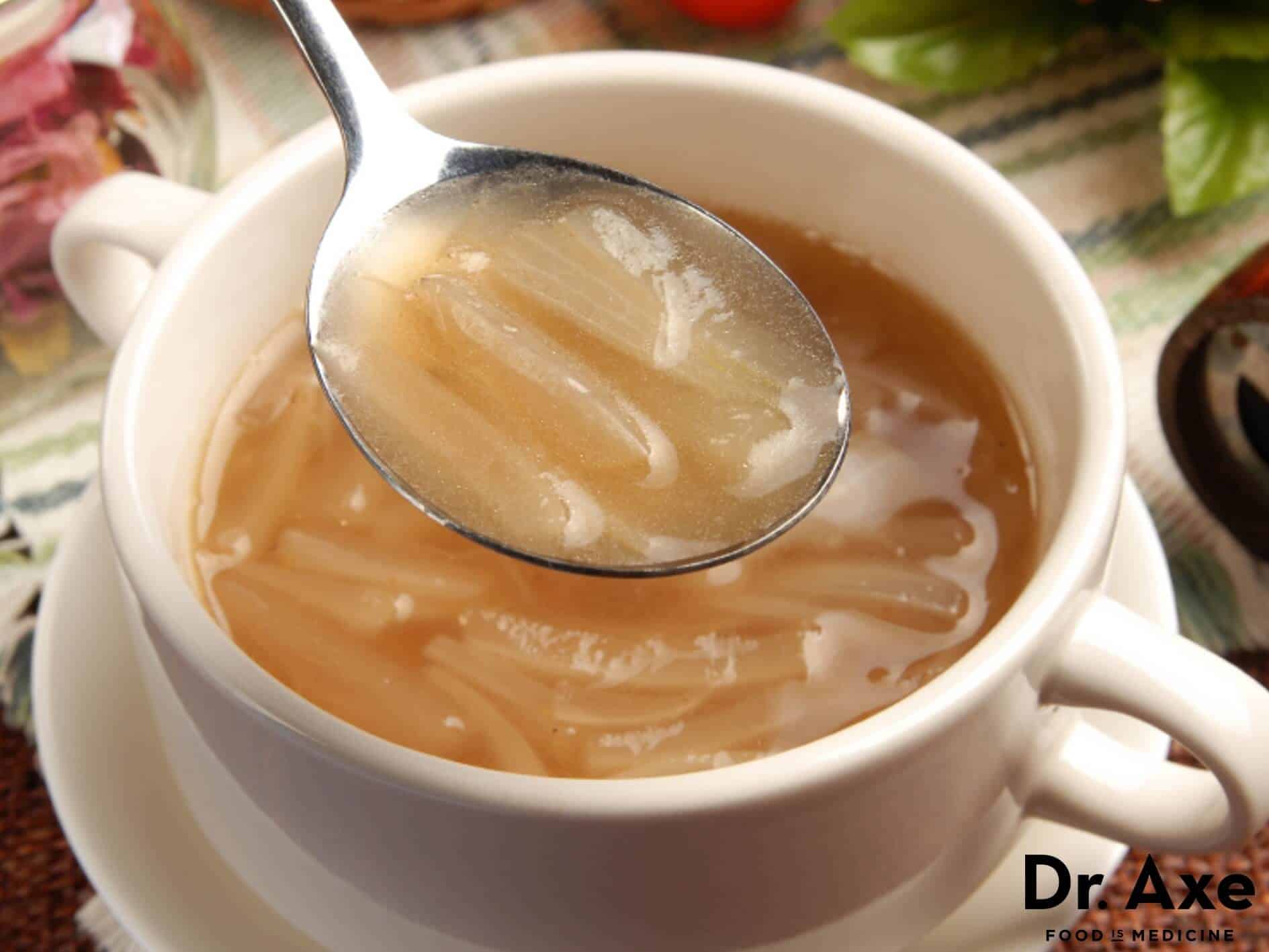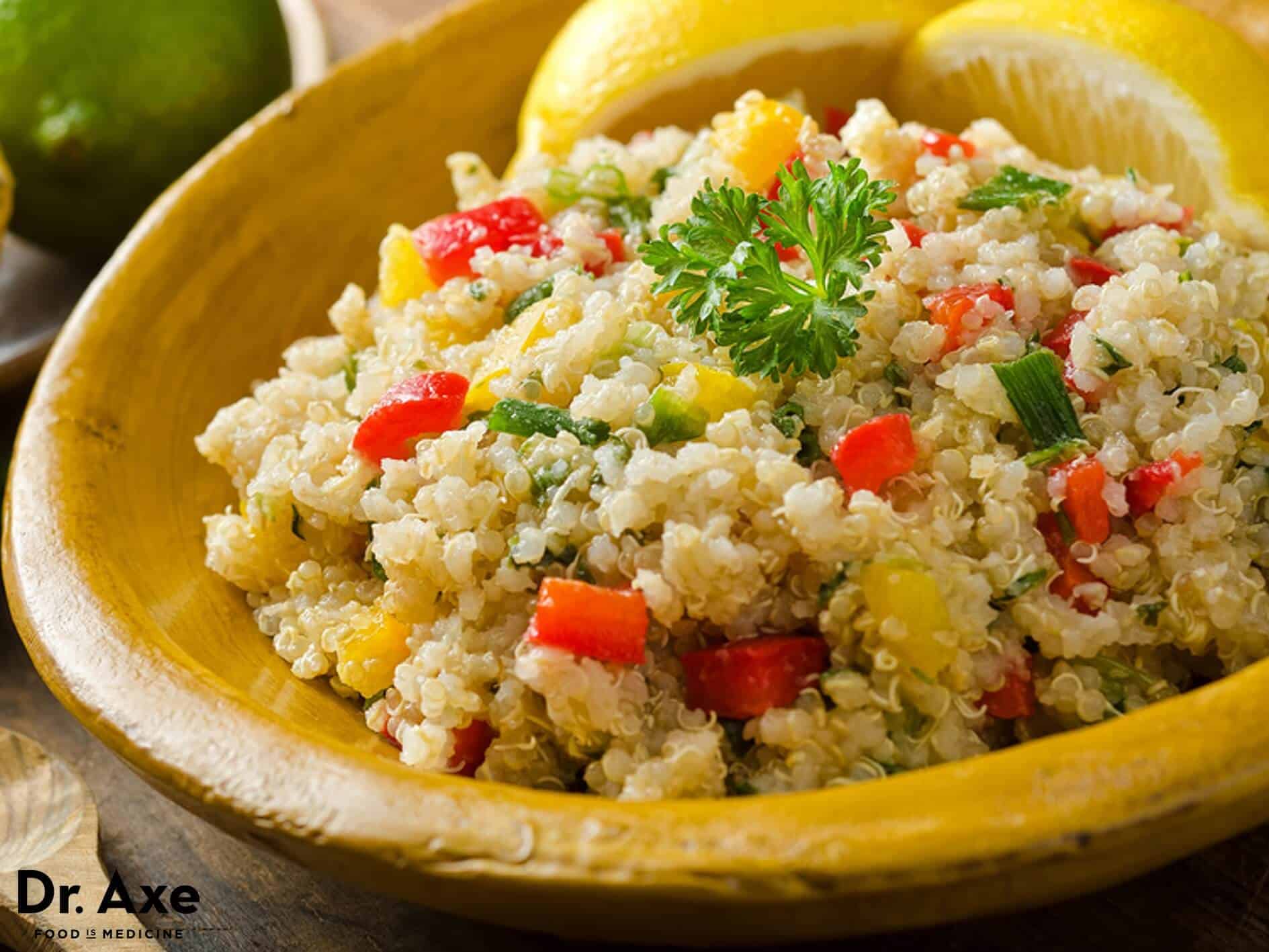Onion Nutrition: Natural Antibiotic & Anti-Cancer Aid
Whether it’s white, red or yellow onions, these pungent allium vegetables pack numerous health benefits in addition to big flavor. Through a high supply of nutrients and antioxidants — including flavonoids and polyphenols — onion nutrition can help you maintain better blood sugar levels, facilitate in building strong bones and be protective against inflammation, which we know is at the root of most diseases.
Studies have linked onions to cancer and heart disease prevention, plus lower risks of developing arthritis, asthma, diabetes and neurodegenerative disorders.
Onions (species name Allium cepa L) are a member of the Liliaceae plant family, which also includes other flavorful allium vegetables like garlic and leeks. Allium vegetables contain therapeutic oils that hold sulfur compounds (cysteine sulfoxides), which are partially responsible for their signature smell and taste, but also for many of the health benefits of onion nutrition (especially when it comes to naturally treating cancer). (1)
Some of onion’s most important antioxidants include flavonoids like quercetin and anthocyanins. At least 25 different flavonols have been identified across all onion varities! Quercetin is considered an antihistamine phytonutrient that’s often found in allergy products because it can lower the effects of histamines on the immune system. And anthocyanins, the same type of antioxidants found in red berries, are responsible for giving red onions their deep color. (2)
Another form of onions’ flavonoids are alkenyl cysteine sulphoxides (ACSOs), sulfur compounds that have been reported to have a range of health benefits, including anti-carcinogenic properties, anti-platelet activity, anti-thrombotic activity, anti-asthmatic and antibiotic effects. (3)
Ever wonder why your eyes water when cutting an onion? It’s because cutting onions punctures their cell membranes that store ACSOs. While it might be inconvenient to tear up while cooking, as you can see it’s a small price to pay for the very impressive roles that these compounds hold when it comes to disease prevention!
Onion Nutrition Facts
You may like sweet onion varieties best, like vadalia onions and shallots, because they tend to have a milder taste and can even be eaten raw, but compared to white and red onions, these usually have a lower percentage of beneficial compounds. According to research looking at onion nutrition, yellow onions contain the most quercetin and also the most sulfuric compounds, but red onions are higher in other protective antioxidants (as indicated by their color).Sweeter onions are left in the soil longer before being harvested so more of their carbohydrates have a chance to turn to sugars, hence their sweeter taste. Some research suggests onion nutrition improves as onions are left in the ground longer. In general, the longer onions are left in the ground, the sweeter they taste but the lower phytonutrient count they have. Usually, the more potent the smell and taste of an onion is, the more nutrients are present (and therefore the onion is more likely to make you tear).
One cup of raw, chopped onions contains about: (4)
- 64 calories
- 0 grams fat
- 2 grams protein
- 2 grams fiber
- 7 grams of sugar
- 8 milligrams vitamin C (20 percent DV)
- 0.2 milligrams vitamin B6 (10 percent DV)
- 0.2 milligrams manganese (10 percent DV)
- 22 milligrams folate (8 percent DV)
- 234 milligrams potassium (7 percent DV)
- 46 milligrams phosphorus (5 percent DV)
- 0.07 vitamin B1 thiamine (5 percent DV)
Onion Health Benefits
1. Helps Fights Cancer
According to many clinical studies looking at onion nutrition benefits, onions help reduce the risk of developing colon, ovarian and mouth cancers through their rich supply of antioxidants that prevent cell damage. Onion’s sulfur compounds have been found in studies to prevent the growth of tumors and cancer development by protecting cells from mutation and inducing apoptosis.Even consuming onions just several times per week has been linked to cancer protective benefits. But, of course, the more you consume onions, the more cancer protection you receive. For example, large studies from southern European populations published in the American Journal of Clinical Nutrition show an inverse association between the frequency of consuming onions and other allium vegetables and the risk of several common cancers. (5)
2. Protects Heart Health
Onions have fibrinolytic benefits, meaning they provide cardiovascular protection by reducing the risk of blood clot formation. Additionally, they can protect against “bad” LDL cholesterol. They do this by limiting the activity of harmful free radicals within blood vessels, therefore lowering oxidative stress and improving blood circulation and blood pressure levels.3. Helps Maintain Strong Bones
Onions nutrition has positive benefits for bone health because onions can help foster greater bone mineral density, which lowers the risk for fractures. A study done by the Department of Family Medicine at the University of South Carolina found that bone density increased in women as the frequency of onion consumption increased.Women who consumed onions once a day or more had an overall bone density that was 5 percent greater than individuals who consumed onions once a month or less. Researchers concluded that women who consume onions most frequently may decrease their risk of hip fractures by more than 20 percent versus those who never consume onions. (6)
One possible mechanism responsible for the bone-building benefits of onion nutrition might be onions’ GPCS substances (gamma-L-glutamyl-trans-S-1-propenyl-L-cysteine sulfoxides), which help inhibit the breakdown of bone and prevent osteoporosis and reverse corticosteroid-induced bone loss.
4. Can Help Prevent or Manage Diabetes
A large meta-analysis done by the Plant Resources Research Institute in Korea found that onion extract can help fight diabetes because onion intake may be effective for lowering plasma glucose concentrations and body weight. (7) Onions are an effective, natural way to control the level of blood sugar released into the bloodstream and prevent insulin resistance.Onion nutrition research also shows that onions supply chromium, which is beneficial for controlling blood glucose and may be beneficial for preventing diabetes.
5. Lowers Risk of Arthritis and Asthma
Because onions as a great anti-inflammatory food, they’re one of the best vegetable choices if you suffer from painful inflammatory diseases like arthritis or asthma. According to the National Arthritis Foundation, quercetin found in onions may be especially beneficial for arthritis sufferers because it helps inhibit inflammation-causing leukotrienes, prostaglandins and histamines that worsen pain and swelling. (8)6. Defend Against Respiratory Infections
The next time you’re suffering from a cold or respiratory illness, try consuming more onions as a natural way to beat that cold. Experts believe that certain onion nutrition phyonutrients can increase immune defense; fight inflammation; reduce mucus in the nasal passages, lungs and respiratory system; and can help you feel better quicker.7. May Help Improve Fertility
Antioxidants have a big impact on sperm health parameters, so onions may be one natural way to improve fertility. When researchers from Azad University in Iran investigated the effects of onions on fertility of rats, they found that total testosterone significantly increased, as did sperm concentration, viability and mobility in the rats who received high levels of onions over the course of 20 days. (9)Onions’ History
Many ancient populations believed that onion nutrition has a beneficial effect on disease treatment and should be part of a healing diet, so records show that onions have been used worldwide as a valuable medicinal and food source for thousands of years. Although there’s no conclusive evidence as to where they first appeared, onions history goes back about 5,000 years to parts of Iran and West Pakistan.Onions might be one of the earliest cultivated crops because they were less perishable than other foods of the time, last a long time, are transportable, can easily be grown year-round, and grow well in different types of climates and soils. They can also be dried and preserved, which has made them a valuable source of nutrients during times of famine.
Some records show that onions grew in parts of China, India and Egypt around the time of 3500 B.C. In Egypt, onions were even considered to be an object of worship and symbolized eternity because of the onion’s “circle-within-a-circle” structure. Paintings of onions can even be found within the inner walls of the ancient Egyptian pyramids and tombs! Onions were also eaten by the Israelites and mentioned as one of the Bible foods, along with cucumbers, melons, leeks and garlic.
Today, onions are consumed around the world, and luckily they’re even increasing in popularity significantly in the U.S., as more people learn about the ways that onions nutrition can link flavor and health. The U.S. is now the third leading provider of onions; the biggest growers of onions today include China and India, followed by the U.S.
How to Buy Onions
A benefit of onion nutrition that might surprise you? Reports show that onions are actually one of the vegetables least contaminated with pesticide chemicals. In fact, some sources say that they’re the very lowest vegetable in terms of storing pesticide residues.Therefore, buying organic onions isn’t always necessary if you’re looking to eat healthy on a budget; you can save your money to spend on other produce instead that tends to be sprayed win higher levels of chemicals (like spinach, apples and berries).
Onions are known to last a long time, especially for a vegetable. You can store onions on your countertop for just about a month before they start to go bad so there’s no downside to stocking up on them when you’re at the grocery store.
The Best Ways to Prepare and Store Onions
Here’s something else somewhat unique to onions in regard to their storage: When they’re left near potatoes, they absorb ethylene gas that potatoes give off and tend to spoil at a much quicker rate. So it’s always best to keep onions and potatoes separate — but keep both unrefrigerated.You don’t want to refrigerate uncut onions because this actually makes them spoil sooner. But once you do cut open onions, keep them in the refrigerator and use them as soon as possible in order to make sure all of their beneficial nutrients are still intact. Because they have a strong odor and smell, keep them separate from all other foods in a tightly sealed container so your whole refrigerator or freezer doesn’t wind up absorbing the onion smell and taste!
How To Cook Onions
There are dozens of ways to use onions in healthy recipes every single day. You can add them to eggs, throw them in to soup, try raw red onions on salads, add some to quinoa recipes or brown rice pilaf dishes, use them to make sauces in order to lend flavor to fish or other proteins, and many other ways too.Different onions are best in different types of recipes; for example, red onions and shallots are usually the kind eaten raw, while white and yellow onions are preferred when cooked. No matter the type you choose, keep in mind that a high percentage of valuable phytonutrients — which are the keys to the many onion nutrition benefits described above — are stored toward the surface of the vegetable right under its thin, paper-like outer peel. To maximize the benefits of onions, only peel off the onion’s outermost layer and consume the rest of the fleshy, moist parts.
Something else interesting about preparing onions? Studies show when you cut onions open, if you leave them exposed to air for about 10 minutes their phytonutrient content actually increases and becomes more absorbable. If you have the time when cooking, chop your onions and leave them on a cutting board for several minutes before adding them to recipes.
You can bring out the naturally sweet flavor of onions, as well as the absorbability of onion’s nutrients, by briefly cooking them. The thinner you slice onions, the more quickly they will cook; the longer you cook them, the more their sugars are released and the sweeter they taste.
Try sautéing them in some coconut oil or olive oil briefly, or submerging and boiling them in stock, which will absorb their flavors. Compared to many other vegetables, onion’s phytonutrients are usually well-preserved during cooking and aren’t considered very delicate compounds.
Healthy Onion Recipes
Onions are extremely versatile in recipes; in fact, they’re used in just about every culture’s cuisine in the world in one way or another, whether French, Chinese, Mexican or Indian. Try some of these onion recipes to add antioxidants and protective phytonutrients to your diet, along with plenty of low-calorie, natural flavor.Onion Soup Recipe
This onion soup recipe is healing to your gut and still full of good flavor! It’s easy to make and a great addition to any meal.Total Time: 45–60 minutes
Serves: 6–8
INGREDIENTS:
- 4 large onions, peeled and thinly sliced
- 2 cups chicken bone broth
- 2 cups beef bone broth
- 4 tablespoons ghee
- 5 garlic cloves, chopped
- Sea salt and black pepper to taste
- In a stock pot over medium heat, melt ghee and thinly sliced onions.
- Cook onions until lightly caramelized. Add bone broth and garlic. Season with salt and pepper to taste.
- Bring mixture to a boil, and then reduce the heat and allow to simmer for 30–50 minutes (the longer the more flavor).

Quinoa Pilaf Recipe
This Quinoa Pilaf Recipe is a great side. Quinoa is a grain that is high in protein.Total Time: 30 minutes
Serves: 2
INGREDIENTS:
- 2 tablespoons coconut oil
- 1 medium organic yellow onion, finely chopped
- Half organic red bell pepper, finely chopped
- 1 organic garlic clove, minced
- 1/4 cup currants
- 1/4 cup chopped almonds
- 1 cup quinoa
- 2 cups water
- 1/8 teaspoon black pepper
- 1/4 cup chopped fresh organic chives (or green onions, including the greens)
- Sea salt to taste
- 1 teaspoon cayenne pepper
- Heat 2 tablespoons coconut oil on medium high heat in a pan.
- Saute the onion, bell pepper, garlic and currants, stirring occasionally until the onions are translucent, but not browned.
- Remove from heat and put into a large serving bowl.
- Stir in almonds, basil, chives, cayenne. Add salt and pepper to taste.
- Cook quinoa, water, one teaspoon of salt, and simmer for 20 minutes, stirring occasionally for a couple more minutes. The quinoa will become tender, and most of the water should be absorbed when done.
- Serve sautéed veggies over bed of quinoa.

Breakfast Salmon Egg Bake Recipe
This Breakfast Salmon Egg Bake Recipe is a favorite! It’s easy to make and full of flavor, protein and omega-3 fats. It’s gluten-free, grain-free and sure to please all.Total Time: 55 minutes
Serves: 4–6
INGREDIENTS:
- 2 tablespoons ghee
- 1 medium onion, thinly sliced crosswise
- 8 large eggs
- 1 cup red, yellow and/or orange peppers, chopped
- 1 cup kefir
- 1 cup mushrooms
- 1 tbs chopped fresh dill
- Sea salt and black pepper
- 1 teaspoon nutmeg
- 6 ounces smoked wild caught Alaskan salmon, skin removed and roughly broken into 1/2-inch pieces
- 3/4 cup goat cheese, crumbled
- Preheat oven to 350 degrees F.
- Melt the ghee in a 10-inch sauté pan over medium-high heat. Add the onion and peppers and cook, stirring occasionally, until soft and turning translucent, about 3 minutes. Add the mushrooms and cook until softened and slightly browned, another 3 to 4 minutes. Remove the pan from the heat.
- Spread mixture with ghee over bottom of greased pan.
- Spread salmon pieces over onion mixture.
- Beat the eggs in a medium bowl with the kefir, 1 tablespoon of the dill, 1/4 teasoon salt, 1/4 teaspoon pepper and the nutmeg.
- Pour egg mixture over onion mixture.
- Bake for 35–40 minutes.
- Sprinkle goat cheese over top and serve.



This comment has been removed by the author.
ReplyDeleteThis comment has been removed by the author.
ReplyDelete